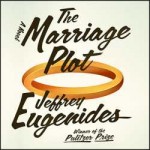The Book Club is a regular feature in which Full Stop editors and guests discuss a book in depth over the course of the week. This time we’re reading The Marriage Plot, a new novel by Jeffrey Eugenides and published by Farrar, Strauss and Giroux. We’ve discussed the novel all week: catch up on Monday’s, Tuesday’s, Wednesday’s, and Thursday’s posts, and check back next month for our discussion of Dwight MacDonald’s Masscult and Midcult.
 ALEX SHEPHARD, FULL STOP EDITOR-IN-CHIEF
ALEX SHEPHARD, FULL STOP EDITOR-IN-CHIEF
In an interview that Farrar Strass & Giroux posted recently on YouTube, Jefferey Eugenides says something along the lines of “The Marriage Plot is a book about how books influence people.” When I first heard this, I was annoyed — I thought it was just pandering — but now I think it actually fits both the novel and our discussion, both of which centered around the ideas of agency and acquiescence.
I think what Eugenides was referring to, somewhat indirectly, is a question that is apparent throughout the book — from Madeleine reading Barthes to Mitchell’s experience with religious mysticism to Leonard’s mental illness: how much agency do we have over our decisions? The Marriage Plot is obsessed with the idea that our agency is influenced — or perhaps co-opted — by external influences. That our lives can be dictated not by decisions, but by our reading habits or body chemistry.
To put it simply, The Marriage Plot is about the question of free will. Set at a time in the character’s lives in which they are suddenly free to choose their path — the moment at which they’re graduating from college — The Marriage Plot is also a novel, as Michael Schaub pointed out in his response, about the first post-sexual-revolution era: a time in which young adults were free to invent their own sexual and marital norms. And yet perhaps the book’s greatest strength is how claustrophobic and trapped the characters feel in their own lives. This, more than anything, communicates the stress that results from the perception of choice, while simultaneously being weighted down by all of one’s influences (whether those influences be reading or genetic material). Choice is its own claustrophobia. In this way, the novel fits its time period — which was, in 1983, the Reagan Revolution — a reaction against all of the choice fought for in the preceding decade.
But the book’s strength is also its weakness: it doesn’t have a message, an answer, or an agenda. Like its characters, the book simply passively describes a dilemma that has flummoxed philosophers and theologians for centuries: are we free to make our decisions?
This post may contain affiliate links.








